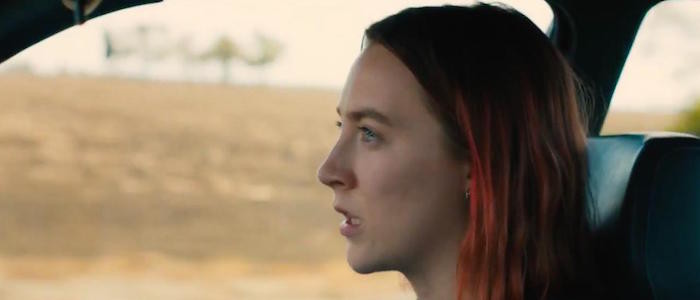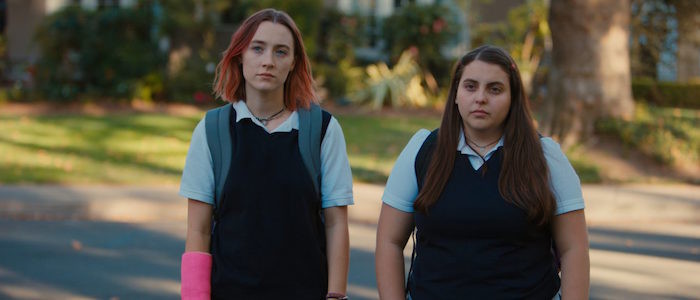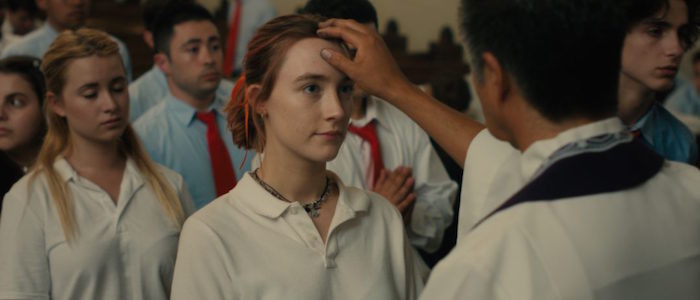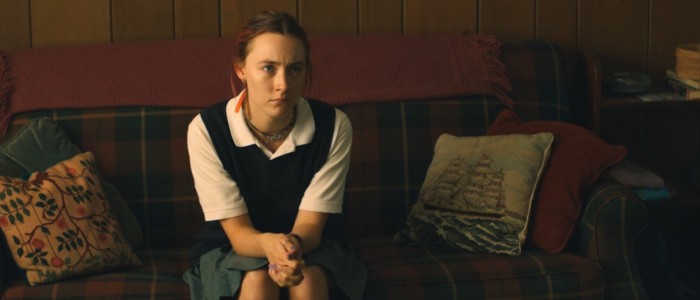Why 'Lady Bird' And Its Awards Attention Feel So Important
Lady Bird is a big deal. It's one of the best-reviewed films of all time, is raking in major awards nominations and wins (like its recent Golden Globe for Best Motion Picture Musical/Comedy), has no shortage of famous fans (Stephen Colbert called it one of the best movies he's ever seen), and has made writer/director Greta Gerwig the figurehead of a movement to better-respect female filmmakers and storytellers. Awards season hype is often prone to hyperbole, but in the case of Lady Bird – a film so soft, quaint, and realized – the praise doesn't feel like too much. It feels exactly right, if somewhat surprising.
Why is that? I've been wondering since I saw the film in early autumn why Lady Bird is so magnetically and universally appealing. Perhaps it's the relatable aspects: it's hard to find a woman who doesn't connect with it in some way, whether it's through the titular Lady Bird's idiosyncrasies, her relationship with her mother (played with devastating accuracy by the great Laurie Metcalf), or in Sacramento's class dynamics. But that's all surface-level. There are deeper-layer elements of Lady Bird that make a film that, in other years, would be written off as light teenage girl fare rather than a major awards contender.
Here are some of the reasons Lady Bird has transcended its teen genre to become one of the most instantly beloved films in recent years.
It’s about a woman who’s confident
This is the biggest one for me, and for its star Saoirse Ronan. "I had never really read [...] a young female heroine like that before, somebody who kind of very much sees herself as a heroine," Ronan recently told W Magazine for their Screen Tests series. "You never see young girls actually, like, love themselves in films."
And it's true. Most stories about young women have an element of self-loathing. Even 2016's excellent Hailee Steinfeld-starring The Edge of Seventeen – a spiritual cousin of sorts to Lady Bird – is about a teenage girl who hates herself, even humorously declares her desire to commit suicide. John Hughes classics like Pretty in Pink and Sixteen Candles have female leads who are uncomfortable with their bodies and social status.
But Lady Bird believes in herself, sometimes to a fault. She dreams of better things for her life than what she's currently got; she wants to see the world, experience culture. She knows she's smart, funny, and desirable. And even though she's occasionally and self-awarely in over her head, it never fully derails her steadfast pledge to be and do more. For so many of us, it's the first time we've seen a female character like this, and that's part of why her story is so important for our cultural moment.
It also takes teenagers seriously
There's nothing frivolous about Lady Bird. Her problems, and her friend's problems, have a gravity that so many teen films shy away from or laugh at. There may be worse things to come as they transition to adulthood, but what they're feeling in the here and now is equally weighted. This idea is sort of summed up in Lady Bird's clap-back to Kyle (Timothée Chalamet) after he groans about her being upset that her loss of virginity wasn't what she thought it'd be, telling her there are bigger things in the world to be upset about. "Different things can be sad," she says. "It's not all war."
There's plenty of teenage sadness in Lady Bird. Like her closested first boyfriend (Lucas Hedges), who is terrified of what his Irish Catholic family will think of him. Or her best friend Julie (Beanie Feldstein), whose unrequited love for her teacher is made melancholy when you consider how strongly she desires a consistent male role model in her life. Even popular girl Jenna (Odeya Rush) – who wades in her family's gargantuan pool, throws parties while her parents are home, and brags about weekends in cabins with boys – is sadly bereft; she's resigned to her life in Sacramento, knowing it won't get much better for her than the here and now.
All of this matters. And even as Lady Bird's mother chastises her for not caring about what's going on around her – her father's lost job, their dwindling funds – we can still feel sad when boys take advantage of her, or when her friendships fall apart, or when she doesn't get into the schools she wants. Gerwig is perfectly able to balance these realities in a respectful way.
It doesn’t make a big deal of the little details
Lady Bird never goes out of its way to explain what isn't immediately obvious. A lesser movie would bog you down with backstory and intricacies that don't matter, but Lady Bird is a confident enough movie to move forward without playing catch-up. We know Lady Bird's father (Tracy Letts) is depressed, but there's no tedious explanation as to when or why it started. We know her brother Miguel (Jordan Rodrigues) is adopted, but the movie never tells us that specifically, never gives him a tragic history, never differentiates him from Lady Bird in relation to their parents: he's merely her brother, their son. We know Miguel's girlfriend (Marielle Scott) lives with the family, that her own family is strict, but we get no additional facts. Did she get pregnant? Was she caught doing something specific? We don't know and it doesn't matter.
The film also contains a whole scene that fits this principle of showing without elaboration. It's when Lady Bird's drama teacher, Father Leviatch (Stephen McKinley Henderson), is in the hospital, being tended to by Lady Bird's mother, who we know is a psychiatric nurse. She questions him about his symptoms, when all of this started. Does he have family, anyone he can tell? He says no. We never return to this subplot, but again it doesn't matter. It serves the purpose of reminding us the difference between teenagerdom and adulthood, and that the figureheads in our lives have the same emotions and tragedies bubbling under the surface that rest of us do.
It isn’t showy
Oscar-bait movies are so often exactly that: bait. They dabble in traditional touchstones and rarely amount to much more than that. Actors wear prosthetics, gain weight, don accents. They play figures from history; they deliver big, fussy monologues. The films focus on a recognizable moment in time, or they have some sort of gimmick. (It's a throwback musical! It was shot in one take!)
Last year's Best Picture winner, Moonlight, was noticeably different. That film has almost zero Oscar-bait traditions. It wasn't bait at all; it was an anomaly. Or, it was a new direction for a clouted system.
Lady Bird isn't like Moonlight in any other way than that: it isn't trying to be an Oscar movie, but was propelled through to the end by simply being good. The actors aren't in heavy makeup, there are no monologues, no showy moments that will look good in a montage. It's a period film, yes, but the year is 2002, a truly unglamorous time. Saoirse Ronan isn't suppressing any part of herself to be Lady Bird, isn't punishing her body to get in character. She's a young, confident girl ready to take on the world. Something Lady Bird, the film, is doing for her.




